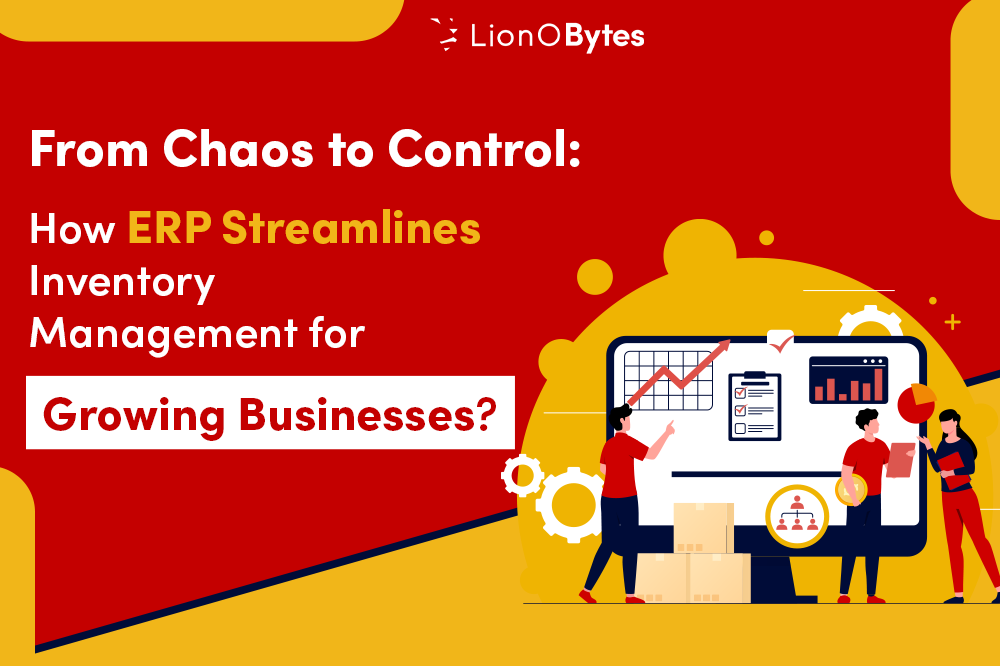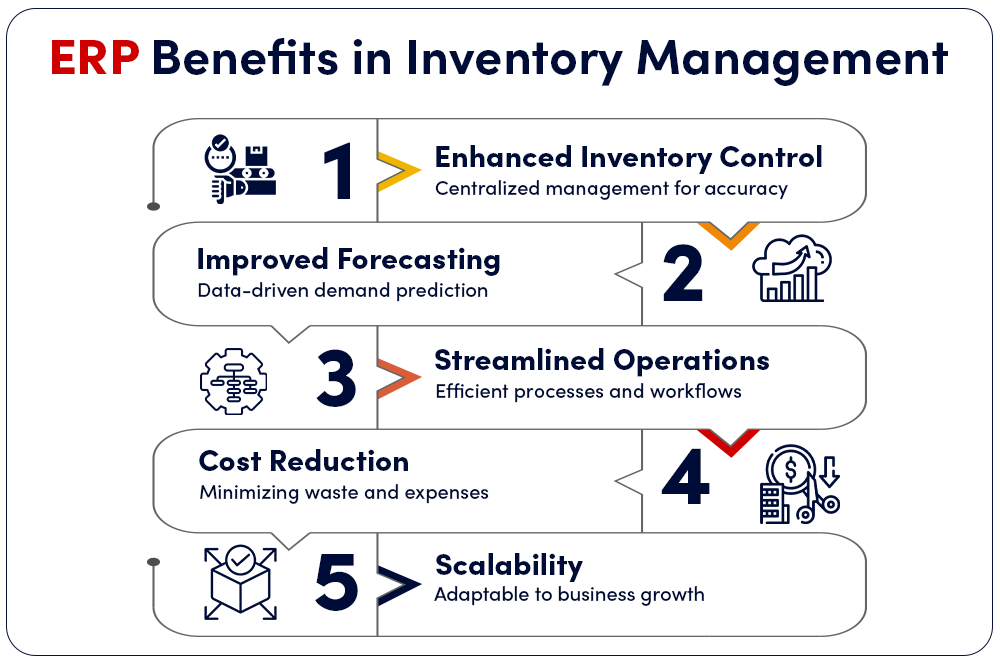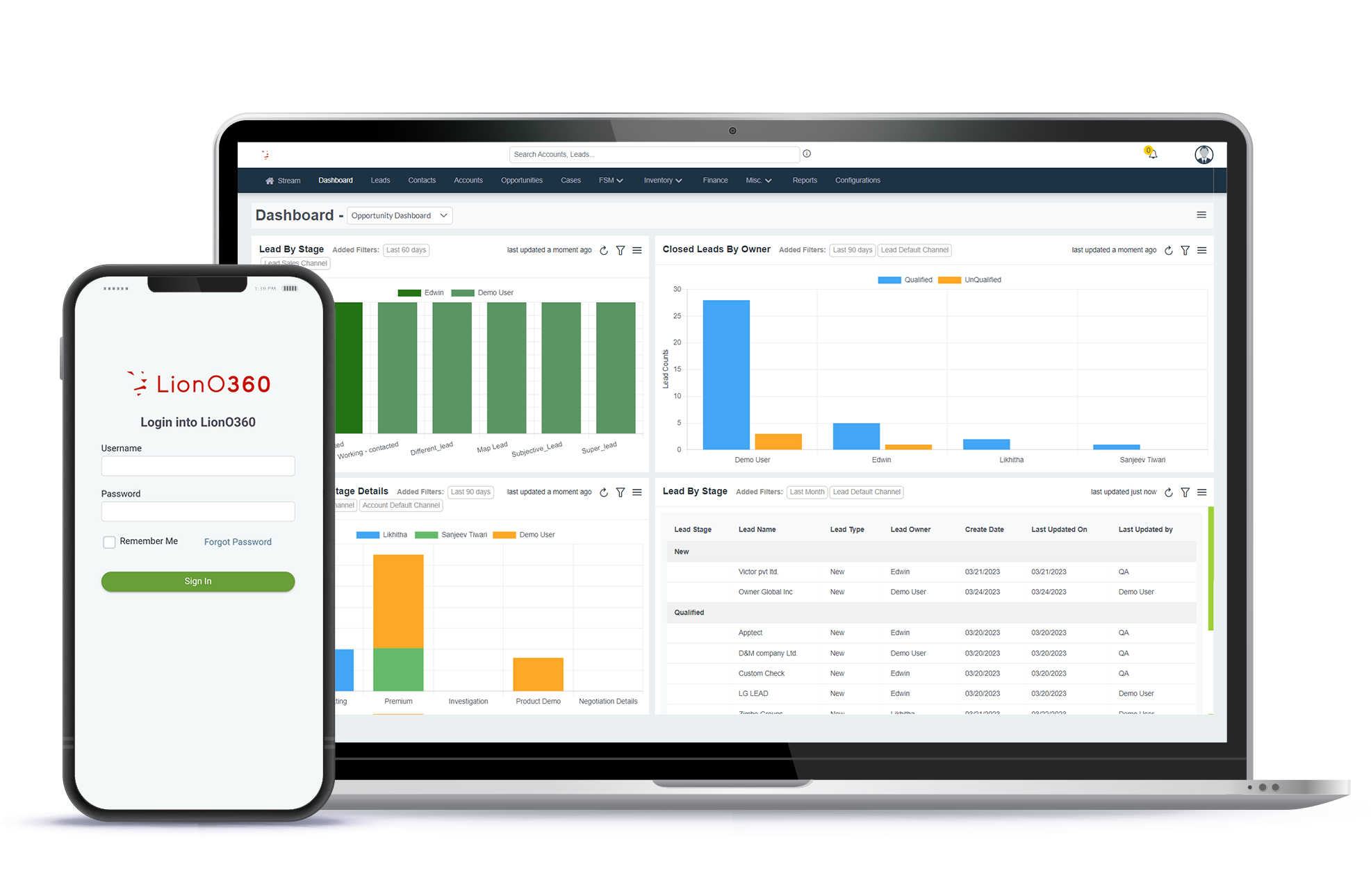
As companies grow, inventory control tends to turn into a game of juggling, one that is capable of either making or breaking the efficiency of operations. Juggling manually, stock discrepancies, and miscommunications between departments easily snowball into expensive errors. This is where Enterprise Resource Planning (ERP) systems come into play as the game-changer. By integrating various business functions into a centralized platform, ERP simplifies its automated inventory management systems giving growing businesses the visibility and control they need to scale with confidence. In this blog, we’ll explore how ERP solutions streamline inventory processes, reduce errors, and boost productivity for businesses on the rise.
Efficient inventory management systems provide the tools needed to transform inventory chaos into streamlined workflows, ensuring accurate stock levels, timely replenishments, and improved customer satisfaction. By adopting the right ERP solution, businesses not only gain control over their online inventory management system but also lay a solid foundation for sustainable growth. Now is the time to move beyond spreadsheets and siloed systems—embrace ERP and unlock the full potential of your inventory operations.
How ERP Helps in Inventory Management?
ERP software integrates inventory data, enabling real-time warehouse tracking system, improved accuracy, and improved decision-making. Here's why:
Centralized Inventory Tracking
With ERP, every piece of data pertaining to inventory is stored in one place. That means you can track the level of stocks in various warehouses, locations, or sales channels in real time. Instead of relying on manual update spreadsheets or discrete software, your employees have immediate access to accurate information, reducing errors or duplicate entries.
Batch and Serial Number Tracking
Modern ERP warehouse management system software has batch tracking or serial number tracking, which is important for perishable items, electronics, and pharmaceutical product companies. It promotes better traceability, regulatory compliance in industries, and speedy response to product recall.
Integrated Demand Forecasting
ERP software often has forecasting tools that scan past sales history, seasonal trends, and trends in the market. It enables companies to predict demand more accurately and plan the inventory, avoiding costly holding costs.
Real-Time Reporting and Analysis
ERP applications have reporting tools and dashboards that provide real-time data on inventory performance. Turnover rates, slow-moving stock, and procurement effectiveness can be monitored by managers to allow them to make strategic decisions.
Warehouse and Logistics Management
ERP systems streamline warehouse activities with streamlined pick, pack, and ship processes. ERP systems can even be paired with barcode readers and RFID technologies to make order fulfillment faster and more accurate.
Benefits of ERP in Inventory Management for Growing Businesses

As businesses scale, inventory complexity grows. The more products, locations, and orders you have, the harder it becomes to keep everything running smoothly. CRM and inventory management offer several strategic advantages that are particularly valuable for businesses in a growth phase.
Enhanced Operational Efficiency
ERP automates routine tasks like order entry, invoicing, and inventory updates, freeing up your team to focus on higher-value activities. This improved efficiency reduces manual errors and accelerates the entire supply chain.
Improved Cash Flow Management
By optimizing inventory levels and reducing excess stock, ERP helps free up capital that would otherwise be tied up in unsold goods. It also ensures timely reordering, preventing delays and lost sales due to stockouts.
Better Customer Satisfaction
When you have accurate, real-time stock information, your sales and customer service teams can provide more reliable answers. Faster fulfillment, fewer stock issues, and timely deliveries lead to higher customer satisfaction and repeat business.
Scalability for Future Growth
A key advantage of ERP is scalability. As your business expands—adding new product lines, locations, or markets—an ERP system can grow with you. You can configure modules or add functionalities without needing to switch platforms.
Compliance and Audit Readiness
ERP systems keep detailed records of all inventory transactions, which can be crucial for audits or compliance with industry regulations. Whether it is batch traceability or stock movement logs, everything is documented in one place.
Data-Driven Decision Making
With access to real-time analytics and KPIs, business leaders can make informed decisions about inventory turnover, supplier performance, pricing strategies, and more. This helps reduce risks and seize new opportunities quickly.
Reduced IT Complexity
Instead of managing multiple software tools for procurement, inventory, sales, and finance, a unified ERP system simplifies your tech landscape. This refers to the IT inventory tracking software that means easier maintenance, better security, and lower IT overhead.
Smart Inventory, Seamless Growth — Powered by LionO360 ERP

LionO360 is one of the best inventory management software and gives you total control over your inventory management, smoothly blending in with your customer service, purchase, warehouse, and sales procedures. Whether you work with multiple thousands of SKUs or open new markets, the system grants real-time access to stock levels, product activity, and order status—all under a single dashboard.
One of strongest LionO360 ERP features is its smart auto-replenishment system. It automatically tracks inventory levels and generates purchase orders according to your company rules to avoid costly stockouts or overstocking. With batch and serial tracking integrated into it, you can track products every step of the way—critical for food & beverage, electronics, and healthcare businesses.
But inventory is just the beginning. As an end-to-end ERP, LionOBytes ERP trends integrates your inventory with your CRM, field service, finance, and reporting modules. With this centralized approach, your teams operate from the same data, enabling faster decisions and smoother operations.
Schedule your Free ERP demo, now!
Also Read: Optimizing Order Fulfillment with Pick, Pack & Ship
Frequently Asked Questions
How can ERP improve inventory accuracy?
ERP systems provide centralized inventory tracking, allowing you to monitor stock levels across all warehouses and sales channels in real-time. This eliminates manual updates and reduces errors, ensuring your inventory data is always accurate and up to date.
How does ERP enhance demand forecasting?
A: ERP systems often include forecasting tools that analyze past sales data, seasonal trends, and market patterns. This enables more accurate demand prediction, allowing you to plan inventory levels efficiently and avoid costly holding expenses.
How scalable are ERP solutions for growing businesses?
ERP systems are highly scalable. As your business expands—adding new product lines, locations, or markets—an ERP system can grow with you. You can configure modules or add functionalities without needing to switch platforms, making it an ideal solution for growing businesses.
How does ERP impact customer satisfaction in relation to inventory management?
ERP systems provide accurate, real-time stock information, allowing your sales and customer service teams to provide reliable answers to customers. This leads to faster fulfillment, fewer stock issues, and timely deliveries, ultimately resulting in higher customer satisfaction and repeat business.







